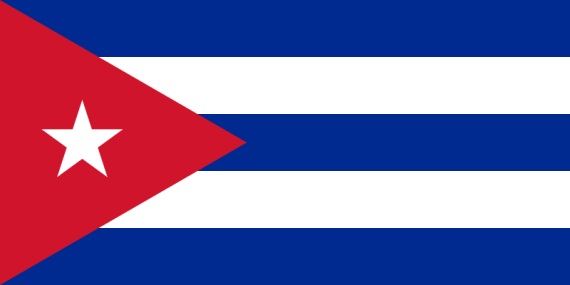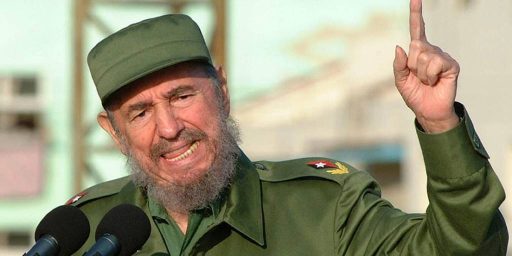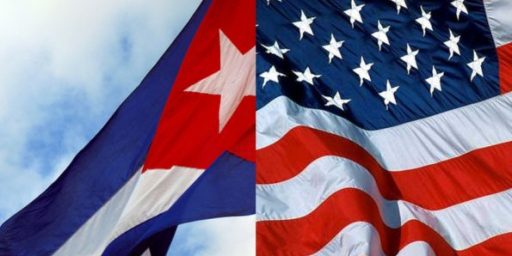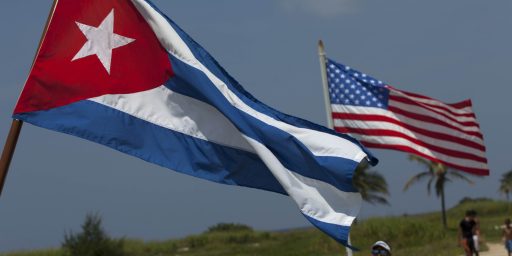Cuba: Threat to Global Security?
Mary Anastasia O'Grady takes Jeffery Golodberg to task over his interview with Fidel Castro. Much hilarity (or, at least, poor analysis) ensues.
 Mary Anastasia O’Grady isn’t especially happy with Jeffrey Goldberg’s interview with Fidel Castro and says so at length in a column in the WSJ: Weekend at Fidel’s.
Mary Anastasia O’Grady isn’t especially happy with Jeffrey Goldberg’s interview with Fidel Castro and says so at length in a column in the WSJ: Weekend at Fidel’s.
Without getting into a point-by-point discussion of either Goldberg’s interview or O’Grady’s problem therewith, let me focus on a specific line:
We are supposed to conclude that Cuba is no longer a threat to global stability and that Fidel is a reformed tyrant.
First, I can’t ignore the fact that this sentence comes after O’Grady notes that Goldberg quotes Castro as telling Mahmoud Ahmadinejad to “stop picking on the Jews.” As such, the conclusion reached that there is a message there about Cuba’s place in the world or anything about Castro’s tyrant cred is a non sequitur.
Second, and much worse: O’Grady apparently considers Cuba to be “a threat to global stability.” This is, of course, utterly absurd. I can understand not liking the regime in Cuba. I can fully appreciate objections to the power that the Castro brothers have. However, the last time that Cuba was a relevant player as a threat to global stability was during the Cuban Missile Crisis of 1962. And even then, the state that was truly relevant in terms of destabilization was the Soviet Union while Cuba just provided the real estate. One could further argue that the Cuban policies to promote communist revolution in Latin America during the Cold War was aimed at affecting regional stability, but the degree to which it was a major threat to said stability was overblown, shall we say. Even so, such activities ended in the early 1990s (which, as the mirror tells me, was a wee bit of a while ago).
Even if one wishes to differ with my basic assessment of history, the notion that Cuba in 2010 has any ability to threaten global stability is laughable on its face. Which, of course, begs the question of why US policy continues as it does.
Also: Goldberg responds to O’Grady here: click.





Because Florida is a swing state.
It works both ways. It’s now not worth the effort to normalize with Cuba. I assume everyone is waiting for Fidel to die and the process can begin without the baggage. I assume also that Fidel understands this.
While I don’t agree with the writers on this blog much at all, I did a take on the Goldberg interview that is a lot closer to your take than O’Grady’s that is at:
http://www.washingtonreb.com/2010/09/23/mellow-fidel/
An exaggeration. Direct Cuban involvement in “wars of national liberation” in Angola, Mozambique, and so on throughout the 1970s and into the 1980s was destabilizing. One can argue whether the destabilization was a good thing or a bad thing but it was definitely destabilizing.
@Dave:
Well, I would consider those to be regional destabilizing, not globally so. Splitting hairs, perhaps, but I see a distinction.
I read the piece and find the statement she made credible. She mentions Palestinian meddling and Cuban agents Venezuela. Cuba had long been an exporter of revolution and anti Western hate. It may be a matter of degrees but your criticism is nit picking. Minor countries have an ability to be destabilizing the same way a few Serbians could be destabilizing about a hundred years ago. Global tensions sometimes need only a small match to erupt.
Besides, her column was more about Goldberg falling for Castro’s tricks.
@Steve: if US policy has to treat Cuba like a major global threat then we really are a paper tiger afraid of our own shadow.
To return to my point though, we have so many Cuban expatriots in this country that I believe normalization will be destabilizing.
This is probably so far OT as to be in the orbit of Mars, but I cannot ever see that name, “Mary Anastasia O’Grady” and not think of Gore Vidal’s literary hatchet job on William F. Buckley, in Vidal’s novel Burr, with the character, William de la Touche Clancey.
“An exaggeration. Direct Cuban involvement in “wars of national liberation” in Angola, Mozambique, and so on throughout the 1970s and into the 1980s was destabilizing”
In a good way – and not “globally’ destabilizing – merely destabilizing to the last vestiges of European colonialism in Africa.
‘Cuba had long been an exporter of revolution and anti Western hate”
Huh? Cuba is most assuredly part of the West. As is Marxism and communism. Some of the parts of the West that Cubans hated were quite deserving of that hate – ie colonial repression – very much a factor in the world when Fidel was in his heyday. Other parts not. But it was a critique and an alternative that was itself fully part of the Western political world.
Why change it? No benefit for the US. Given the intensive spy network Cuba runs in the US, why reward them? Just consider it appropriate time out for Ana Belen Montes, “the U.S. intelligence community’s most important analyst on Cuba,” who pleaded guilty to spying for Cuba for her entire career in US intelligence. Better to wait until the “Cuban Way” has gone the way of all communist ideas.
Obviously Alex Knapp got the answer right.
But surely the Ds and Rs could get together on this and come out with a bipartisan agreement that negates the swingyness of Florida. Local Florida politicians (including Congressional members) could rail against the compromise if they wanted, but it would still get done.
And to answer JKB’s thought – it’s a good thing to do because it would be a good thing for the people of Cuba. And it would eventually lead to better leadership there. And we’d get better rum and cigars. Everybody wins.
To O’Grady every regime that isn’t a slavish sycophant of neocon American foreign policy is a threat to global stability. She’s to be taken as seriously as Bolton. As anyone with an ounce of intelligence realizes, Castro would have been history thirty years ago if we hadn’t elevated his importance by blockading Cuba.